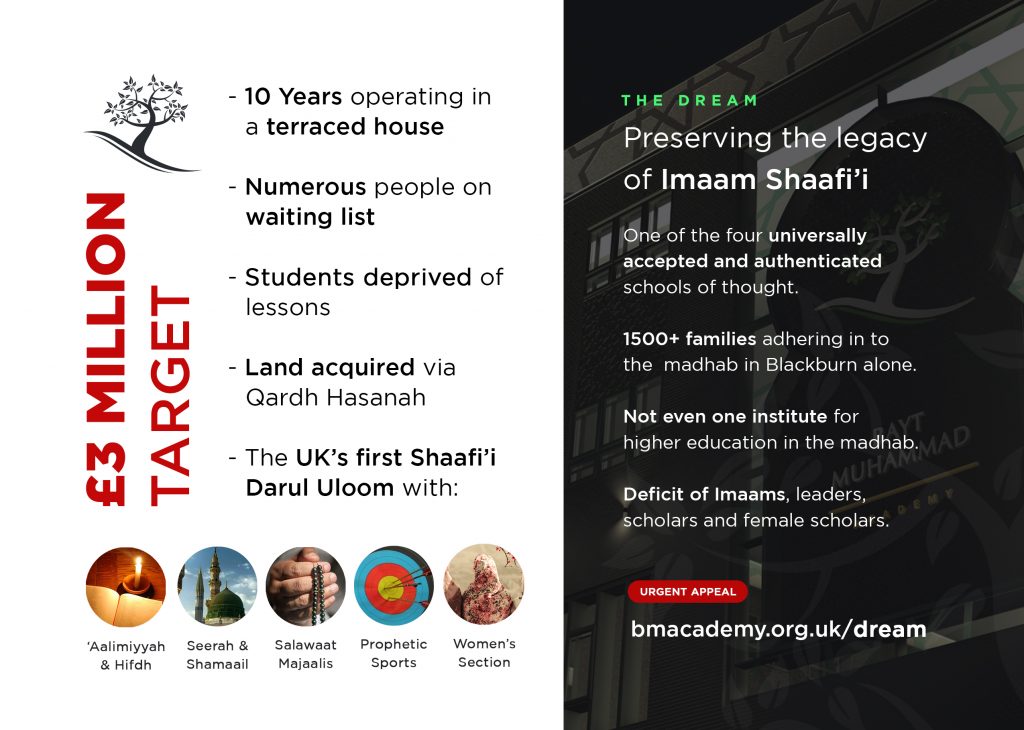بِسْمِ اللّٰهِ الرَّحْمٰنِ الرَّحِيْم
الحمد لله رب العالمين الذي منّ علی المؤمنين اذ بعث فيهم رسولا من انفسهم يتلوا عليهم ايته و يزكيهم و يعلمهم الكتاب و الحكمة و ان كانوا من قبلُ لفي ضلال مّبين
After entering into this world without his ﷺ father, and witnessing the burial of his mother as a six-year-old child, Our Beloved Prophet ﷺ was now only eight-years-old and had also witnessed the funeral procession of his ﷺ grandfather; Abdul-Muttalib. Our Beloved Prophet ﷺ was now living in this world, without a home of his own, without anything or anyone to call his own. At this young and tender age, it felt as though he ﷺ had now become alone this world, living as a transitory guest in the home of relatives. It was experiences like these that prepared the Prophet ﷺ to internalise the fleeting reality of this world, and never get attached to its temporary luxuries. Our Beloved Prophet ﷺ is reported to have said:
كُنْ فِي الدُّنْيَا كَأَنَّكَ غَرِيْبٌ أَوْ عَابِرُ سَبِيْلٍ
“Be in this world as though you were a stranger or a traveller.” (Sahih Al-Bukhari)
It also prepared the Prophet’s ﷺ pure heart to truly feel the sorrow of those who feel alone and abandoned in this world. A heart that would never allow orphans to feel they had no one to care for them. A heart that would never let those who were weak and impoverished feel hopeless. A heart that would attend to those whom society had singled out in the heat of prejudice and superiority. A heart that knew what it was like for them to feel they had no one to say انَا لهم “I am here for them”.
But it was those beautiful souls that Allah سبحانه و تعالی had chosen to enter into the life of his Habeeb Al-Mustafa ﷺ, with hearts full of love and care for him. Those who would show him what it felt like to have someone come to your aid in times of fear and uncertainty, and say – when it feels like there is no one out there for you – انا له “I am here for him ﷺ”. It was these experiences that fortified the pure heart of the Prophet ﷺ with such ambition, that throughout his entire life, he would never allow anyone to feel alone in his presence. An ambition that transcends beyond this earth and beyond this time of ours, to the final hour when all of humanity will say نفسی نفسی “I need to care for myself, for myself!”, and the entire Ummah will be in a state of fear and uncertainty. At that critical hour, it will only and only be his ﷺ heart, that will rise and say انا لها “I am here for them!”.
Imaam Busairi رحمة الله علیه beautifully mentions this in his Burdah:
يَـا أَكْرَمَ الْخَلْقِ مَا لِي مَنْ أَلُوذُ بِهِ
سِـوَاكَ عِنْـدَ حُلُولِ الْحَادِثِ الْعَمِمِ
“O Most Noble of All Creation!, what refuge do I have but you!
When it’s the coming of the universal tragedy?
وَلَنْ يَضِيقَ رَسُـولَ اللهِ جَاهُكَ بِي
إِذَا الْكَرِيمُ تَجَلَّى بِــاسْمِ مُنْتَقِـمِ
O Messenger of Allah, your rank will not reduce for me.
even when The Generous manifests His punishing quality
(Qaseedah Burdah)
Abu Taalib – the Prophet’s ﷺ Dear Uncle
From amongst those whom Allah سبحانه و تعالی had chosen to give him ﷺ special care and love, was the Prophet’s ﷺ uncle Abu Taalib, and his wife Sayyidah Fatimah bint Asad رضی الله عنها. They were parents of the great legions of this Ummah, such as Sayyidinaa ‘Ali ibn Abi Taalib RA, and Sayyidinaa Jaa’far ibn Abi Taalib RA. In his final moments, the grandfather of the Prophet ﷺ had bequeathed the responsibility of his ﷺ guardianship to Abu Taalib, who took upon this responsibility with all his heart and soul for the rest of his life. From this point onwards, Abu Taalib would sincerely take it upon himself to be the primary guardian, father-figure, protector, and friend to the Prophet ﷺ for the next 42 years.
Abu Taalib took the Prophet ﷺ into his home and loved him dearly, even more than his own children. He would keep the Prophet ﷺ by his side at all times, give him preference over his own family and his own self, feed him with love and clothe him with compassion. The Prophet’s ﷺ presence into Abu Taalib’s home brought great barakah and bounty. The household of Abu Taalib would not eat without the Prophet ﷺ, saying that they found such increase and barakah in his presence, and they would feel satiated in their meals when he ﷺ ate with them. (Ibn Saa’d)
Abu Taalib would endeavour to support and assist his beloved nephew at any cost, and serve his mission to the extent that every true believer would yearn to be accepted for such service and assistance to the Prophet ﷺ.
Mercy Descends upon the skies of Makkah
During this time, Makkah was faced by a drought and the people were desperate for rain. Abu Taalib was approached by a group of people to arrange a mass prayer for rain in the Masjid Al-Haram. Abu Taalib agreed, and as he walked out with the procession, some people began gazing upon the face of the Prophet ﷺ who was walking alongside Abu Taalib. The countenance of his face was so striking – filled with an angelic innocence and purity – that the travelers began wondering: “Who is this beautiful child?”.
As they entered the haram and approached the Kaa’bah, the people began flowing in until the haram was filled. Abu Taalib then initiated the supplication for rain and the people followed suit. After earnestly supplicating and imploring for a period of time, there was still no rain, and the people began losing hope. As they started lowering their hands from supplication, a man amongst them suddenly saw a small cloud forming in the sky, and when he looked directly beneath it, he was amazed to see that Abu Taalib’s nephew had raised his beautiful face to the sky. As the man looked back and forth between the rapidly forming cloud and the face of this pure child gazing up to the heavens, he was completely taken aback.
The clouds began to multiply as the people looked up in amazement, uplifted from their disheartened states. Within moments the clouds had turned grey, and raindrops began descending. Abu Taalib looked up in shock and then looked down to see the beautiful face of his nephew honoring the heavens with his gaze. The rain then began pouring down profusely, and continued until streams began to form around Makkah. In awe of this sight those, who had witnessed the underlying factor of this blessed rain rushed to Abu Taalib, enquiring as to who this special child was, whose face had captivated the heavens. It was in regards to this that Abu Taalib had compiled some poetic stanzas about his beloved nephew:
وأبيض يَسْتَسْقِي الْغَمَام بِوَجْهِهِ
ثمال الْيَتَامَى عصمَة للأرامل
“The clouds are irrigated by his ﷺ illuminated face,
He ﷺ is a beacon for orphans and for widows.”
(Ibn Asakir, Khasaais Al-Kubra)
Such was the nobility of his beautiful face, and the reality of the beautiful clouds that formed upon his gaze throughout his life, whenever drought struck – as the narrations report – on multiple occasions. Rather, this was something that transcended beyond his physical worldly life. Years after the Prophet ﷺ had passed away, the people of Madinah Al-Munawwarah faced a drought and sought rain. They expressed their concern to Sayyidah Aa’ishah رضی الله عنها – seeking a solution – and she رضی الله عنها said:
انْظُرُوا قَبْرَ النَّبِيِّ صلى الله عليه وسلم فَاجْعَلُوا مِنْهُ كِوًى إِلَى السَّمَاءِ حَتَّى لاَ يَكُونَ بَيْنَهُ وَبَيْنَ السَّمَاءِ سَقْفٌ
“Look at the grave of the Prophet ﷺ and make an opening facing the sky, so that there will be no barrier between him and the sky.”
Once they did this, Allah سبحانه و تعالی showered his mercy upon the people of Madinah with bountiful rain, until their plants flourished and their camels grew exceedingly fat, and it was called the year of the exceedingly fat animals. (Musnad Ad-Daarimi)
Sayyidah Fatimah bint Asad رضی الله عنها
In addition to Abu Taalib, his wife Sayyidah Fatimah bint Asad رضی الله عنها also showed great love and motherly care to the innocent child she felt immense mercy for, even above her own children. She would feed the Prophet ﷺ and clothe him ﷺ with such love, that it became etched in his blessed heart for the rest of his life. He ﷺ would find comfort in her arms and a world of love in her heart. Decades later, when she رضی الله عنها passed away, the Prophet ﷺ displayed just how deeply she touched his blessed heart. Our Prophet ﷺ, rose to the news of her passing with an aching heart and tears flowing from his blessed eyes. During her burial, he ﷺ took his blessed shirt – which touched his pure skin – and made it as a shroud for her to be blessed and protected in her grave. He ﷺ painfully sat by her head side and emotionally stated:
رحمك الله يا أمي، كنت أمي بعد أمي وتشبعيني وتعريني وتكسيني وتمنعين نفسك طيِّبًا وتطعميني، تريدين بذلك وجه الله والدار الآخرة
“May Allah have mercy upon you, O My Mother! You were my mother after my own mother. You stayed hungry but fed me, you stayed without clothes but clothed me. You deprived yourself of luxuries to feed me, intending by that the pleasure of Allah, and the abode of the hereafter” (Tabarani)
Before her burial, the Prophet ﷺ lay down in her grave and sincerely made Du’aa, beseeching Allah سبحانه و تعالی for her.
May Allah سبحانه و تعالی shower us with his mercy and assistance, through our connection with the beautiful face of his Habeeb Al-Mustafa ﷺ!
Join us tomorrow for our next article: “Bahira: The Monk”

